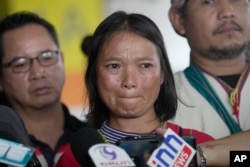A Thai court Thursday found four national park officers not guilty of abducting and murdering an Indigenous rights activist who disappeared nine years ago while aiding a lawsuit against park officials.
Porlajee "Billy" Rakchongcharoen was detained by then-Kaeng Krachan National Park chief Chaiwat Limlikit-aksorn on April 17, 2014, allegedly for illegally harvesting wild honey. Chaiwat and three subordinates are the last people known to have seen Porlajee alive. All four say the activist was released the same day and deny any wrongdoing.
At the time, Porlajee was assisting a group of ethnic minority Karen villagers with a lawsuit against Chaiwat and other officials for their alleged roles in burning down the homes of over 20 families living inside the park in 2011.
Porlajee, a fellow Karen, had been helping coordinate their legal challenge, interpreting between Karen and Thai, and preparing to petition the king on the villagers' behalf. Rights groups say he may also have been carrying documents related to the lawsuit when he was detained.
In Thursday's verdict, the Central Criminal Court for Corruption and Misconduct said there was not enough evidence to convict the accused of Porlajee's abduction or murder, or to even prove that he was dead, questioning the DNA evidence from collected bone shards.
But the court did convict Chaiwat of malfeasance and for not reporting Porlajee's detention to police. He was sentenced to three years in jail.
The other officers — Bunthaen Butsarakham, Thanaset Chaemthet and Kritsanaphong Chitthet — were acquitted on all counts.
Porlajee's wife, Pinnapa Prueksapan, said the verdict left her feeling confused and drained.
"I did not get the justice that I deserve. I've been fighting this case for nine years, almost 10, and now I feel empty. And I think the courts in Thailand are not very fair," Pinnapa said.
"I don't want revenge. I just want them to be held responsible for what they did," she said. "I just want to know how Billy was killed."
Pinnapa said she had not yet decided whether to pursue an appeal.
Rights groups said the verdict dashed hopes of bringing closure to the long-running saga.
"Even after nine years, there's still no justice for the victim. And [in] today's verdict ... the court didn't even confirm they're the remains of Billy. So, it's almost like we're back to square one," Sanhawan Srisod, a legal adviser for the International Commission of Jurists in Thailand, told VOA.
"It constitutes another failure to hold accountable [the] perpetrators for a serious human rights crime like ... murder," she added.
The case had taken a tortured route on its way to Thursday's verdict.
The accused were first charged with murder in 2019, five years after Porlajee disappeared, when police divers found bone shards inside an oil drum at the bottom of a flooded reservoir in the park. After matching samples from the fragments with the DNA of Porlajee's mother, the Justice Ministry's Department of Special Investigations concluded that the bones were likely those of the missing activist.
Within months, though, public prosecutors dropped the charges, citing a lack of evidence from the DNA tests.
The DSI appealed to the Office of the Attorney General, which reconsidered the evidence in 2022 and decided to indict the men again on five counts, including murder and abduction.
The four accused remained free on bail throughout. Chaiwat was at first fired for his alleged role in razing the villagers' homes but was later reinstated and promoted to head of Thailand's Office of National Parks.
Thursday's verdict was not only "disappointing," said Chanatip Tatiyakaroonwong, Thailand researcher for Amnesty International, but "sends a message that there is still impunity for officials who commit this kind of crime."
A United Nations working group on enforced and involuntary disappearance has logged nearly 900 outstanding cases across Southeast Asia since 1980, most of them in the Philippines and Indonesia, followed by Thailand. Rights groups say they believe the true number is much higher, as friends and families of victims often keep quiet out of fear.
Trials of suspected authorities, meanwhile, are as rare as cases are common, said Pornpen Khongkachonkiet, director of the Cross Cultural Foundation, the Thai rights group representing Porlajee's family in court.
Of the more than 90 cases recorded by the United Nations working group in Thailand, Pornpen said she knew of only one other case involving officials that went to trial. In that case in 2004, five police officers initially convicted of the robbery and coercion of human rights lawyer Somchai Neelapaijit were acquitted on appeal.
Getting cases like theirs to trial has been "almost impossible," she told VOA.
"Thai law has only [been] taking murder cases as a serious crime. Then they start investigating. So, when we report [someone] missing, they did not register the case easily," she said, especially when authorities are accused of being involved.
Rights groups are hoping for more success now that Thailand, as of this year, has a law to prosecute cases of torture and enforced disappearances, specifically.
"This type of heinous crime [will] continue to happen around the region and go unpunished unless we have stronger regional collaboration to investigate cases of abductions and enforced disappearances, and hold perpetrators to account in line with international law," Chanatip said.





